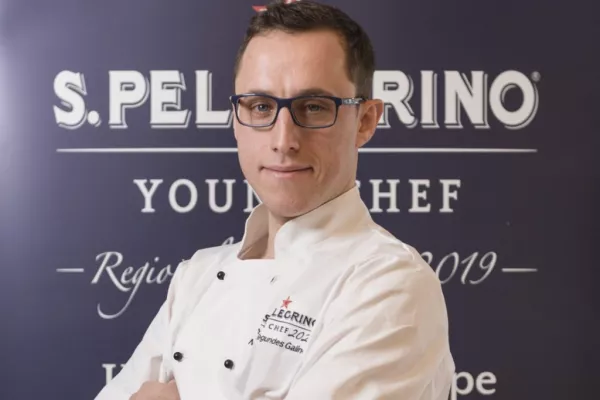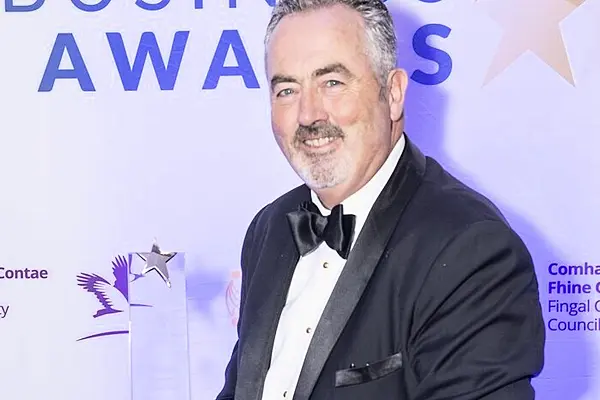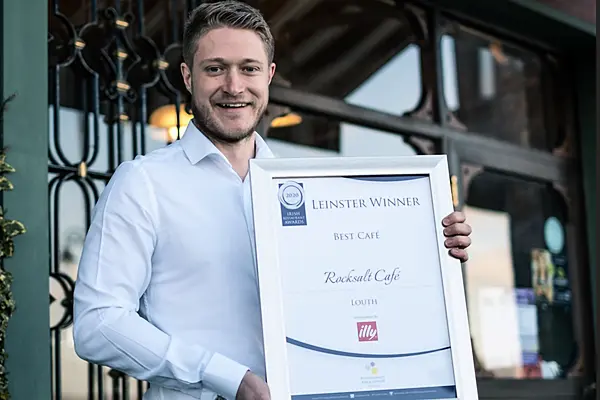Chef Nicolas Fagundes, who has worked at Le Comptoir Café, Pichet and the Greenery, was nominated as one of just 12 finalists from around the world to represent Ireland, the UK and Northern Europe for the Food for Thought Award, judged by international chefs including three-Michelin-starred Mauro Colagreco, Andreas Caminada and Clare Smyth.
This article was originally published in the Winter 2021 issue of Hospitality Ireland Magazine, in December of 2021.
The dish that chef Nicolas Fagundes created – which earned him a place as one of 12 finalists in the Food for Thought Award – was ‘Flavours and textures of palm and ox tongue’. It showcased the connection between Fagundes’ life as a chef in Dublin and his Brazilian heritage. “This dish, to me, means that – with the right intention to create a more dynamic and sustainable environment in our lives – we can understand more how other cultures work. I want to bring them together in one single plate, showing and expressing my roots, where I grew up, combined with the knowledge and techniques acquired during my career living abroad,” Fagundes said.
Where did your interest in food and cooking come from?
My passion for food comes from my childhood. A big part of my family, and the family of my close friends, are Italian immigrants, so food was important for us, and for them. The grandmothers were always passing down their incredible knowledge, cooking the best food in the world and filling our house with delicious smells. So, from very early on, I experienced a huge influence of flavours and tasty food, and from there, every time I was in a restaurant, I used to ask to go and visit the kitchen, to see what was going on – even from an early age. So, I suppose, I never really wanted to be anything else, apart from a cook.
Explain your career so far.
After I finished chef school in 2012, I decided to go away for a year, and the country chosen was Ireland. I entered the professional world of chefs a bit late, as I was 21 when I had my first job as a cook. It was all very exciting. I started as a kitchen porter, then a kitchen porter and assistant chef, and from there I went to work in few cafes and bistros, and it was 2016 when I decided to step up in my career and work in a Michelin-starred restaurant. I printed a few CVs and researched and planned a route to drop them off.
My first stop was Chapter One. I was extremely nervous to go there. For some reason, it took me ten minutes to go down the stairs. I still remember that day very clearly, when I left my CV with Sharon, the hostess at the time. Then, about three minutes later, [former head chef] Eric Matthews rang me and offered me a trial in the pastry section. After the trial, they decided to hire me, and for three years I had the immense luck to work with Stan [Cicon, chef de partie] on the pastry section and also prepare the starters. Then I decided to go for the S.Pellegrino Young Chef of the Year in 2019. I was one of the semi-finalists, and in London I was awarded the Fine Dining Lovers Food for Thought Award and part of the grand finale that took place this year in Milan. This was the most important achievement of my career. So, my whole professional career was developed in Ireland. I was also head chef in Le Comptoir bistro and cafe, in Donnybrook, and now I am exploring my own projects.
What are the differences in food culture in Ireland, compared to Brazil?
The first big differences are the ingredients. The second is what we eat in Brazil. Rice and beans make up the base of meals, with a different protein, like grilled beef or chicken, and salads. When I mean rice and beans, it’s at least three or four times a week. Also, in Brazil – being tropical and huge – you have different ingredients and dishes, from the Amazonia to the very south of the Pampas, close to Argentina and Uruguay, so it’s a complex subject. Being in Ireland for nine years, I can say I really adapted to what we eat here very easily, and every time I go back to Brazil, I want to bring some Irish butter with me! I like the way, here, that the seasons are much more defined as well, which is reflected in Irish dishes.

What, for you, is the most important thing in cooking?
Food is a big part of everybody’s lives, so respect is very important. Professionally speaking, it’s a puzzle of things that are important for you to become a good cook. You don’t need to cook like Gordon Ramsay, but respect fits everybody and in every aspect of our lives – someone worked really hard for you to get that vegetable or fish that you picked at the market. Respect for me is key.
What trends do you see emerging in restaurants over the next year or two?
It’s hard to say. Over the last two years, we saw a huge influence of open-fire kitchens coming back into action, with places like Lignum opening up all around the world. For the next two years, I think, the pandemic just changed everything. I think businesses must adapt to the staff shortages, and maybe change the way they do things and menus, for example, but, food wise, I think I’ll see a lot more plant-based restaurants around.
What is the most challenging part of your job at the moment?
I would say staff shortages, for sure, and the pandemic makes everything a bit up and down, so it’s up to the business to adapt to those situations.
What is the most rewarding?
An empty plate and a happy customer, or when you pass your knowledge or learn something with your co-workers – these are feelings that make all the harshness of the kitchen disappear – so, when people are happy at your restaurant, and to see people developing around you.
How do you relax?
I like going to the gym a lot. It helps me to keep my body and mind fit, and I love going out for dinner with my girlfriend, or to a pub, just to enjoy a good pint and live music. I like to keep myself active on my days off and other days of the week, even if it is doing something at home.
Read More: Hospitality Ireland Winter 2021: Read The Latest Issue Online!








